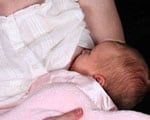Women who do not breastfeed their babies are more at risk of developing type-2 diabetes, the most common form of the disease, later in life than mothers who did.

There has been a substantial increase in the prevalence of diabetes in many countries including a rise in the number of diabetic women over 20 years or older. As such, it is important to identify behaviors that modify women's risk of diabetes. Diet and exercise are widely known to impact the risk of type-2 diabetes, but few people realise that breastfeeding also reduces the mothers' risk of developing the disease later in life. In women with recent gestational diabetes (diabetes developing during pregnancy), lactation has been found to improve sugar and fat metabolism and data indicates that longer duration of breastfeeding may reduce women's risk of developing type 2 diabetes mellitus. However, the minimum duration, exclusivity, and consistency of breast feeding required to reduce a woman's risk of developing diabetes is unknown.
To explore the relationship between lactation and type 2 diabetes, researchers studied 2,233 women aged between 40 and 78 years. Overall, 56 percent of mothers reported they had breastfed an infant for at least one month.
It was found that twenty-seven percent of the mothers who did not breastfeed developed type-2 diabetes and were almost twice as likely to develop the disease as women who had breastfed or never given birth. Conversely, mothers who breastfed all of their children were not more likely to develop diabetes than women who never gave birth. Consistency of lactation also was associated with risk of developing type 2 diabetes with mothers who had never breastfed being more likely to have developed type 2 diabetes than mothers who consistently breastfed. Mothers who had never breastfed also tended to be more likely to have developed diabetes than mothers who inconsistently breastfed. These long-term differences were notable even after considering age, race, physical activity, tobacco and alcohol use.
The reasons why mothers who do not breastfeed are at increased risk of diabetes remain incompletely understood. Breast feeding may decrease belly fat gained during pregnancy. However, mothers who breastfeed for shorter durations may not lose all the fat they acquire during pregnancy. As the fat around the abdomen and trunk is more metabolically active than fat depots in other body areas, mothers who retain belly fat face an increased risk of diabetes. The study provides another good reason to encourage women to breastfeed their infants, at least for the infant's first month of life. However, further studies are needed to identify the pathways and mechanisms through which breast feeding reduces subsequent risk of diabetes.
DoctorNDTV is the one stop site for all your health needs providing the most credible health information, health news and tips with expert advice on healthy living, diet plans, informative videos etc. You can get the most relevant and accurate info you need about health problems like diabetes, cancer, pregnancy, HIV and AIDS, weight loss and many other lifestyle diseases. We have a panel of over 350 experts who help us develop content by giving their valuable inputs and bringing to us the latest in the world of healthcare.












